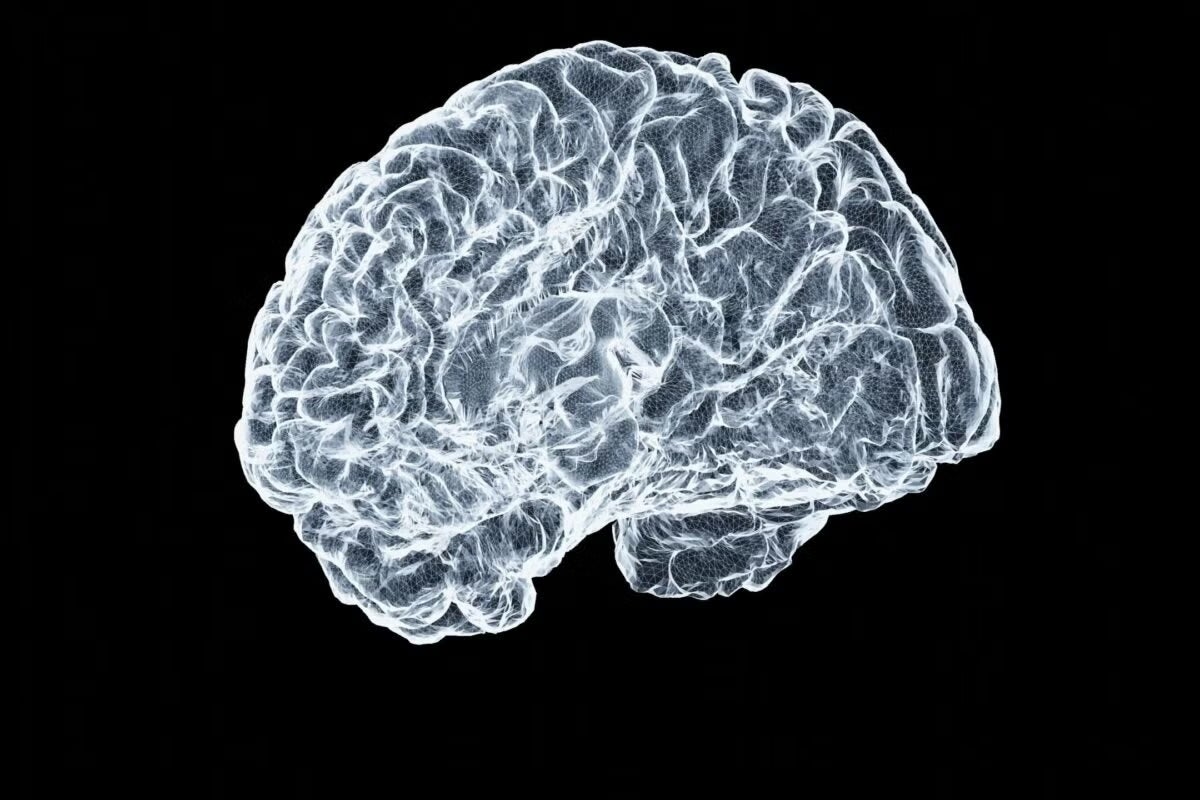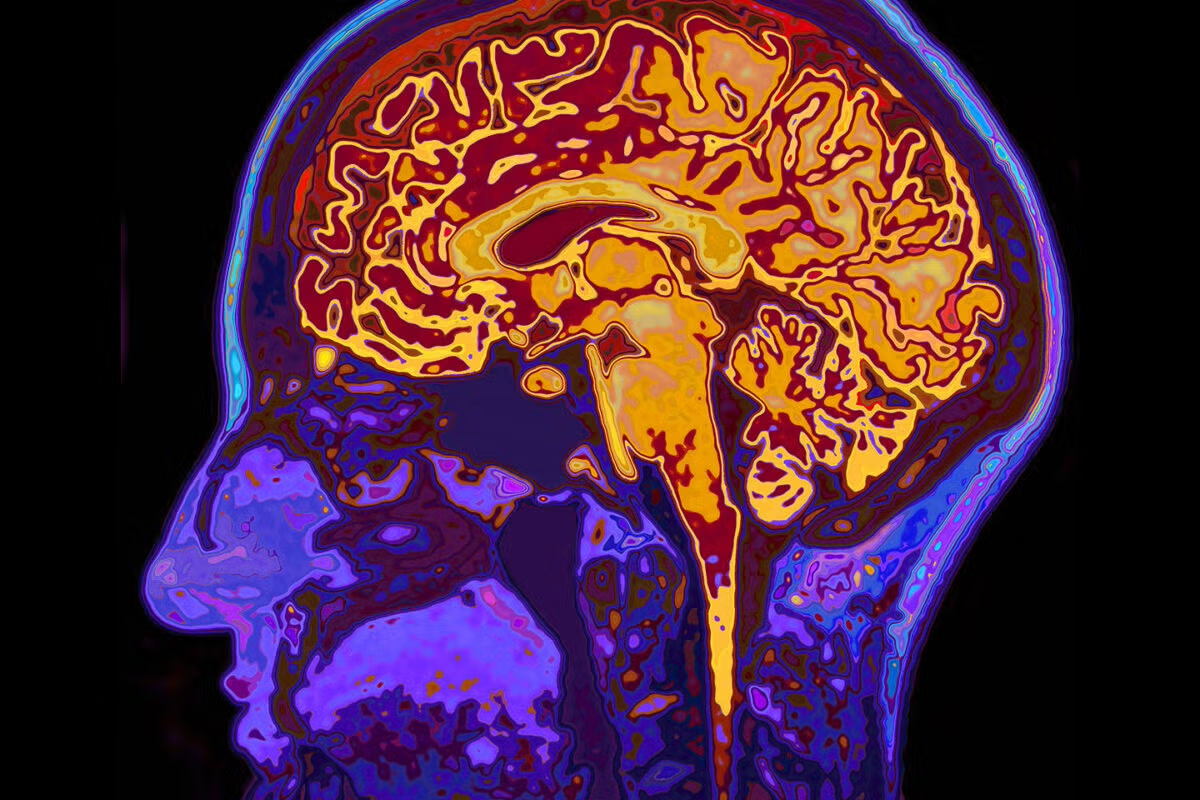Which Mental Superpower Would You Choose?
In this episode of Point of Discovery, we talk to neuroscientist Laura Colgin about the potential, and possible pitfalls, of new technologies that connect the human brain to a computer.

What if people who lost a particular brain function—say, an Alzheimer's patient who can no longer make new memories—had the same option as many people who've lost limbs or other body parts—the chance to use technology to supplement what's no longer there? Or what if you could boost a healthy person's brain, essentially giving them mental superpowers, like the ability to become a Kung Fu master by downloading new skills directly to your brain?
Scientists are now working on brain-machine interfaces, systems that connect the human brain to a computer to do something neither the brain—nor the computer—can do alone. In this episode, we talk to neuroscientist Laura Colgin about the potential, and possible pitfalls, of these new technologies.
Tell Us What You Think
Hey, podcast listeners, we've set up an online survey where you can tell us what you like about the show, what could be better, and you can even tip us off to cool research going on right here at the university.
TRANSCRIPT
MA: This is Point of Discovery. If you could choose one superpower, which would you choose? Flying? Invisibility? Telepathy? Today, we meet a neuroscientist who has been thinking about how the study of the human brain combined with advances in biotechnology might someday allow humans to have MENTAL superpowers.
LC: This can be an advance in human intelligence and we can all become smarter and learn better and all these things.
MA: But first, we'll talk about ways that new technologies might restore normal brain function in people with cognitive or neurological disorders such as Alzheimer's disease.
MA: What if people who lost a particular brain function had the same option as many people who've lost limbs or other body parts – the chance to use technology to supplement what's no longer there? Neuroscientists, engineers, military researchers—and Silicon Valley entrepreneurs—are all working on these brain-machine interfaces, also known as neural prosthetics. These are systems that connect the human brain to a computer to do something neither the brain—nor the computer—can do alone. One idea is to help people with Alzheimer's disease by downloading their memories and then serving them back to them when they need them.
LC: If a patient is unable to consciously retrieve lost memories, maybe the memories are actually still there, but it's some problem with the connection of being able to retrieve them from storage. So if we can decode those lost memories, perhaps we can feed that out to a computer and in some way retrieve the information.
MA: That's Laura Colgin, a neuroscientist at the University of Texas at Austin, who studies brain waves in an effort to learn how memory and learning work.
LC: Or, maybe in another type of a situation if somebody has a shut-in syndrome, then where they're unable to, you know, communicate their thoughts or their intentions, that we could decode the brain signals and know what they are intending or planning to do or what they're thinking about and again feed that out to a computer so that suddenly, they would be able to communicate with the outside world again.
MA: Before this vision can be realized, neuroscientists like Colgin have to learn more about how memory and conscious thoughts work.
LC: I mean it's not even agreed upon across the field how memory consolidation works or how memory retrieval works or how memories are stored long term. And those sort of issues are really important key questions that, we're making progress on those questions definitely, through various avenues, but we still don't understand everything.
MA: But even when researchers discover these the brains basic operating instructions, there are still some daunting engineering challenges for neural prosthetics. So far, all the ways that people have successfully connected machines to brains have had big downsides. Some require that you drill a hole in someone's skull and implant wires and batteries – invasive methods that could damage brain cells, cause discomfort or lead to infections. Non-invasive methods have trouble picking up clear signals. Colgin says a safe, practical and effective device for reading and restoring memories in humans is probably at least a decade away.
LC: That would be my guess.
MA: So in our lifetimes?
LC: Hopefully, yes. Hopefully. I think at least in our lifetime we'll know whether it's feasible or not. … I'm a very open-minded person. … so I'm open to the possibility that these aspects of our conscious experience like memory might not be something we can pinpoint in physical matter. There might be some aspect we'll never be able to measure or access.
MA: Now think about your own brain: even if it hasn't lost any core functions, you probably wish it could do more, right? What if brain-machine interfaces could be used to super-charge a normal brain? Tech entrepreneurs like Elon Musk—founder of Tesla and SpaceX—and Bryan Johnson—founder of online payment company Braintree—have launched companies that are focused on enhancing the human brain through technology. In a sense, they want to upgrade the human operating system.
MA: Well let's play a little game. As I was reading up on this, I read some pretty far out ideas of things that people would like to do in terms of not just correcting disorders but augmenting the human brain. Which of these ideas would you want to have, these superpowers, right? One idea is telepathy, you could share your thoughts and ideas maybe your own visual images that your brain is bringing in, you could share those with other people. Would you want that power?
LC: No. [laughs] Um. No. No.
MA: Why?
LC: I think my face always gives away what I'm thinking. It's hard enough for me to keep my feelings private and sometimes it's important. Right? That's what makes us human, is that we have the ability to not just blurt out everything we're thinking because sometimes it's inappropriate or it could be hurtful to someone, hurt someone's feelings.
MA: Okay so another idea. This idea that you could download skills, something you've never learned how to do, let's say martial arts. You could attach your brain to a computer, that would suddenly download all the ability to be a Kung Fu master. Would you do something like that?
LC: Yeah, I would do something like that. Because I think that sort of stuff, it's not really. Those sort of behaviors that are more unconscious, you know, I think that that doesn't factor as much into your sort of own personal experience of your intellect and your emotions and your experiences that make you who you are. Right? Because I mean if we, if we learn to swim for example and we're getting better at swimming, we're just doing it through motor practice, but we can't really explicitly say what it is that we did that made us be able to swim faster now than we did last week. Right? So it's a different type of experience -- that I think – that I would – that would be completely awesome. I would definitely do that.
MA: Okay, let's see, so going down the list. So this was kind of a far-out idea. They're suggesting that you could maybe extend the natural range of your senses. So humans have a limit on the range of colors we can see. We can't see into the ultraviolet or the infrared. Uh, we can only hear up to a certain frequency of sound [laughs] what would you -- I've seen images of what a bee sees when it sees flowers, they can see all sorts of unusual patterns because they can see ultraviolet light. Would you want that superpower?
LC: Yeah, I think that would be cool. The only thing that I would worry about there is that we know that once some type of sense gets enhanced or even lost, that there's always a compensation, right? ... Because, probably there's areas of the cortex that are devoted to representing what we see and those areas if they are available can take over other functions and represent things in a more complex way. So if we are then enhancing what we are able to see, probably vision would take over some cortical space that's devoted to something else and then we could potentially lose some aspect of our experience and maybe we won't hear things as well or smell things as well or whatever the case may be.
MA: Okay, so one last hypothetical. So this is an actual project apparently. So Facebook is working on a project where you could think of words like, normally you would type words on a computer with your fingers, but the idea is to circumvent that and you would just think a stream of words and the computer would immediately read those out and that you could do that at a much higher rate than you could type. ... Would you want that skill?
LC: Yeah, I would try it. I think there's a certain timescale to how we're used to thinking about complex ideas. So for me, I definitely notice that sometimes if I have writer's block when I'm trying to work something out with a scientific paper, work though ideas for a grant, I'll go back to hard paper and pen and write things in longhand if I have to work through something. And it's sometimes easier for me to do that than it is to do typing. I feel like I can think more deeply when I'm writing longhand. So I think that it could be very useful for certain things if you were really, if you really didn't have to think out very deeply what you were writing.
MA: So how do I feel about all this? Alzheimer's is a terrible disease. If technology can help make people's lives better, I'm all for it. On the other hand, trying to endow normal, healthy people with mental superpowers—like seeing ultraviolet light or knowing what my sister in California is literally thinking at this exact moment—I'm not so sure. What if we get the superpower we always wanted, and it turns out to be a curse? It's also easy to imagine an access problem. If only the rich can make themselves mentally superior—whether with technology or with gene-editing or whatever—society would have a problem. I asked Colgin how other regular people react when she describes these ideas in her public talks.
LC: I think people are excited but people also do get, some people get scared. Right? They get worried because they might think, Oh, you know, can this be used for mind control? Or, you know, I just have to reassure people that, No, there's no way that we can decode these brain signals non-invasively. That doesn't exist at the moment at least.
MA: And what about her? How would she answer the 64 thousand dollar question: With a normal, healthy brain, would she opt for her own brain-machine interface?
LC: I personally wouldn't choose to do it. It is exciting to me. I think my idea about it has sort of changed. When I first started doing the work, I was excited about it and I thought yeah, this can be an advance in human intelligence and we can all become smarter and learn better and all these things. But I don't know. I think I've changed my idea about it over the last couple of years, thinking about … how memory changes throughout the course of our experience, then I don't know. I guess I go back and forth. And as a scientist, you do sort of have a desire to get some data from yourself ("Oh, that would be fun.") But a lot of scientists throughout history have done crazy stuff. But at this moment in time that you are sitting here talking to me, No, I wouldn't choose to have it until I was experiencing some kind of memory disorder.
MA: Point of Discovery is a production of the University of Texas at Austin's College of Natural Sciences. We're on the web at pointofdiscovery.org. Our senior editor is Christine Sinatra. I'm your host and producer Marc Airhart. Thanks for listening!



